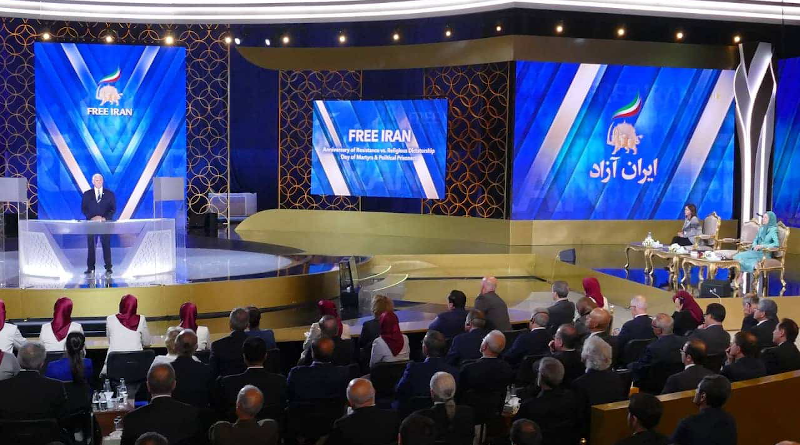Pence’s Support For Exiled Iranian Opposition Points To Real Possibility Of Regime Change – OpEd
By Giulio Terzi
On Thursday, June 23, former US Vice president Mike Pence traveled to Albania to visit Ashraf 3, the residence-in-exile for approximately 3,000 members of the leading Iranian opposition group, the People’s Mojahedin Organization of Iran (MEK).
Ashraf 3 was established in 2018 in the wake of MEK members’ evacuation from Iraq, where they’d resided as a self-sufficient community since the 1980s, before finding themselves beset by Iran-backed militias after the 2003 US invasion and subsequent withdrawal from Iraq.
Ashraf 3 has become, during recent years, the focal point of Iranian opposition against the clerical regime.
Mike Pence’s visit to Ashraf 3 follows only a month after a similar visit by former US Secretary of State Mike Pompeo. At that time, I wrote that European leaders should heed Mr. Pompeo’s words publicly supporting the Iranian Resistance. I said that the explosive state of Iran’s society suggests that this regime is living on borrowed time. Sooner or later, the people of Iran and their resistance movement will bring the change to Iran. It is up to European leaders to decide on which side they will stand.”
A change in Iran towards democracy is not only an Iranian problem, even though it should come from inside Iran and nowhere else. But once materialized, the stabilizing regional effects would go far beyond Iran. Iran’s mullahs are today part of any problem in the troubled Near and the Middle East.
Mike Pence’s visit to Ashraf 3 proves the correctness of the political approach. By stressing a firm policy vis-s-vis the regime in power in Iran, the West would stand on better ground even before an eventual regime change in Iran.
This is our sole counter-act in the face of Iran’s regional adventurism, which aimed to bully us into accepting such behavior as a useable tool in the diplomatic arena. Such devices would not remain useable only in the region.
In June 2018, four Iranian operatives, including a high-ranking diplomat, were thwarted in their effort to set off an explosive device at the annual NCRI rally just outside Paris. Tens of thousands of Iranian expatriates attended the rally. The ensuing trial of those operatives established that the highest authorities in the Islamic Republic had ordered that attack, which could have injured or killed American and European dignitaries that attended to show their support for the MEK and its “Resistance Units” working for the overthrow of the theocratic dictatorship.
The four received up to 20 years in jail in Belgium and are now serving time.
However, the main target of that plot was Maryam Rajavi, NCRI’s president-elect, who ultimately has to serve as president of a transitional government in future Iran.
Pence said, “Maryam Rajavi’s Ten Point Plan for the future of Iran will ensure the freedom of expression, the freedom of assembly, freedom for every Iranian to choose their elected leaders.”
He called the plan “a foundation to build the future of a free Iran.”
Domestic unrest has intensified throughout the Islamic Republic, carrying on a pattern that has been ongoing since the end of 2017, when a nationwide uprising encompassed more than 100 cities and towns and brought slogans like “death to the dictator” more fully into the mainstream.
Iran has undergone at least nine such uprisings in less than five years. These have been fueled by economic discontent but have invariably provided an outlet for geographically and demographically diverse expressions of outrage at the ruling system. Unrest has been constant since the regime removed food subsidies in early May, proving that the Iranian people can expect their situation to continue growing worse and that the Iranian government has no interest in altering its priorities to help alleviate that suffering.
That political intransigence provides fuel for the movement to secure regime change – energy that has been utilized in equal measure by exiled Iranian opposition activists and by the Resistance Units promoting the MEK’s 10-point plan inside the Islamic Republic.
Iran’s political alternative is showing its image more than ever.
A wrong notion, sponsored by the mullahs and their political lobbies, that the Western world must either embrace the existing regime or risk chaos in Iran, has not stood up to scrutiny. But it has perhaps never been more obviously false than it is today. Neither has the existing regime ever been as vulnerable as it is now. Experts like Pence and Pompeo are urging us all to take advantage of that situation.
In less than a month, NCRI’s annual rally takes place, with a conference in Albania joined through tens of thousands of virtual points elsewhere in the world to resonate with Iran’s democratic alternative. A privileged opportunity to exchange on the current Iranian situation that I never miss.
But Europe should join the effort in force. Last year, the Slovenian PM Janez Jansa, acting head of the rotating EU presidency, participated in the gathering through a strong-worded message asking for Iran’s mullahs to be held accountable for their systematic violation of Human rights.
Pence and Pompeo’s visits this year should encourage such firm acts in Europe.
Giulio Terzi (@GiulioTerzi) is a former foreign minister of Italy, former Italian Ambassador to the United States, former Permanent Representative of Italy to the United Nations, and a member of the Advisory Board of United Against Nuclear Iran (UANI).

